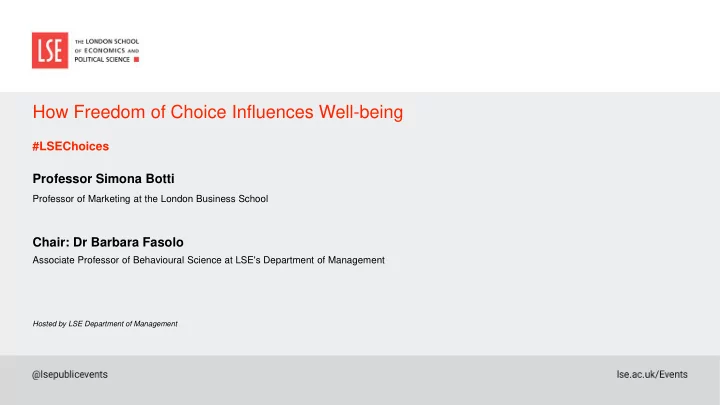

How Freedom of Choice Influences Well-being #LSEChoices Professor Simona Botti Professor of Marketing at the London Business School Chair: Dr Barbara Fasolo Associate Professor of Behavioural Science at LSE's Department of Management Hosted by LSE Department of Management
How Freedom of Choice Influences Well-being Simona Botti London School of Economics Public Lecture 28 November 2019 london.edu
Choice freedom “Giving patients more choice about how, when and where they receive treatment is one cornerstone of the Government's health strategy” (http://www.dh.gov.uk) “Many students would like more choice in their courses: fewer core and more electives”
Experiments: Why and when Specific, simple hypothesis Causality
Undesirable options Tasty options : Yucky options: Mint, Cocoa, Cinnamon, Brown Sugar Sage, Chili Powder, Tarragon, Celery Seeds --Botti and Iyengar (2004)
Satisfaction and consumption Satisfaction Consumption (ml) 9 30 8 25 7 20 6 5 15 4 10 3 5 2 1 0 Tasty Yucky Tasty Yucky Choice No-choice
Experiments: Limits Relevance External validity
Tragic choices “ A generation ago, patients argued for more information, more choice and more say about treatment. To a great extent that is exactly what they have received: a superabundance of information, often several treatment options and the right to choose among them. As this new responsibility dawns on patients, some embrace it with a sense of pride and furious determination. But many find the job of being a modern patient, with its slog through medical uncertainty, to be lonely, frightening and overwhelming.” --Hoffman ( The New York Times , August 14, 2005)
In-depth interviews Americans “ No one should even ask a mother to make such a choice. How did they get me to do that? (…) Now I live with having made the decision. I feel a strong sense that I let him down.” “I walk around thinking ‘what if, what if’!? If the vent was not removed, he would still be alive. I have been questioning myself ever since E. died (…) They should have given me enough time to overcome my fears.” French “No one could do anything. I never blamed myself. I don’t want to hold a grudge against anyone (…) N. is gone but he brought us so much, a different perspective on life. Despite our misery, there weren’t only bad moments (…)” “I don’t have all the pieces of information, the ultrasounds and so on. I have no expertise whatsoever to evaluate the real condition of my baby (…) The physicians are the ones who can evaluate the damages, who know what to do and to ask a parent to withdraw or not, that is too hard.” --Botti, Orfali, and Iyengar (2009)
Negative emotions 9 8 7 6 Choice 5 No-Choice 4 3 2 1 Control No responsibility
Charitable giving The pictures on the next page are of four disadvantaged girls of about the same age who live in the same region and who are associated with Smile Train. They have already received free cleft surgery, but they still need financial help to start a new life. Which child would you sponsor? Maria Silva Vera Angelica/Control --Cryder, Botti, and Symonian (2017)
Choice of recipient 50% 40% 30% 20% 10% 0% Vera Maria Silva Angelica Control Beauty 14
Charitable giving The pictures on the next page are of four disadvantaged girls of about the same age who live in the same region and who are associated with Smile Train. They have already received free cleft surgery, but they still need financial help to start a new life. Which child would you sponsor? Angelica/Beauty Maria Silva Vera Angelica/Control
Choice of recipient 50% 40% 30% 20% 10% 0% Vera Maria Silva Angelica Control Beauty 16
Replication: Real-life setting
Choice of recipient: Self vs. adviser 50% 40% 30% 20% 10% 0% Vera Maria Silva Angelica Self Adviser 18
Choice of recipient: Self vs. adviser 50% 40% 30% 20% 10% 0% Vera Maria Silva Angelica Self Adviser 19
Choice closure No-close Close
Difficult choices 7 6 5 4 3 2 No-close Close 1 Column1 --Gu, Botti, and Faro (2013)
Indulgent choices Enjoyment 9 8 7 6 5 Cake --Gu, Klesse, Botti, and Faro (wp)
Inferior/superior choices Enjoyment 9 8 7 6 5 4 3 2 1 Inferior Superior --Gu, Botti, and Faro (2018)
Conclusions: Method Strive for simplicity Start with a low-cost test of the hypothesis Include realistic experiments Consider multi-methods Build a research programme
Conclusions: Theory Choice freedom does not always improve satisfaction with the experience Pre-choice interventions can reduce the costs of choice freedom and improve the resulting experiences Post-choice interventions like choice closure can help consumers take stock of past decisions and enhance the enjoyment derived from them
Who are we? The Behavioural Research Lab (BRL) brings together researchers across the world by providing a platform for multidisciplinary research. We facilitate world-class behavioural research and offer newly future proofed facilities in central London with a large and inclusive participant pool and a rigorous ethical protocol. How can you get involved? Interested in conducting research ? BRL is open to researchers from across LSE and beyond. Email us at brl@lse.ac.uk to schedule a tour of the new facilities and talk about the research you want to conduct. Interested in participating in research? Participation is open to everyone (this includes members of the public). You will be paid a minimum of £5 for a 30 minute study, or £10 for anything up to an hour. Sign up today on one of our iPads after this event! Interested in sponsoring the BRL ? Email us at brl@lse.ac.uk Find us on Instagram @ lse_brl and at lse.ac.uk/brl
How Freedom of Choice Influences Well-being #LSEChoices Professor Simona Botti Professor of Marketing at the London Business School Chair: Dr Barbara Fasolo Associate Professor of Behavioural Science at LSE's Department of Management Hosted by LSE Department of Management
Recommend
More recommend